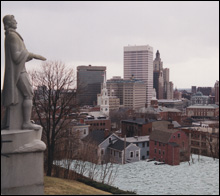 There’s something quaint about the tiny metal sign signifying the Hurricane of 1938’s high water mark on a Dorrance Street building near the center of downtown Providence — as if this kind of destructive flood has been consigned to history.
There’s something quaint about the tiny metal sign signifying the Hurricane of 1938’s high water mark on a Dorrance Street building near the center of downtown Providence — as if this kind of destructive flood has been consigned to history.
As a storm that brought nearly six feet of water into the capital city’s core steadily recedes into the distant past, the passage of time seems to suggest man’s dominion over the elements. In fact, the opposite is true. The human-caused phenomenon of global warming threatens to make the flooding caused by the Hurricane of 1938 a preview of a hot and soggy future.
If global warming isn’t mitigated over the next 100 years, temperatures in New England are projected to rise between six and 10 degrees — increases that would make Rhode Island’s climate more like that of Richmond, Virginia, at the low end, or of Atlanta, at the high end, says Barrett Rock, a University of New Hampshire professor, who is the lead author of a 2001 regional assessment of climate change.
While views vary on the rise in sea level that would accompany this kind of global warming — ranging from about a foot to as much as 30 feet — even a more minimal increase carries severe local implications. “Obviously, for Rhode Island, it’s particularly acute, because we’re a state that is so dominated by our coastline,” says Matt Auten, advocate for the Rhode Island Public Interest Group (RIPIRG). In fact, with a more pronounced rise in sea levels over the next century, downtown Providence will be underwater, as will hundreds of miles of beachfront property. As a dramatically remade state (and one that depends heavily on beach-related tourism), the Ocean State’s nickname could carry unintended irony.
While the United States and other industrialized nations can expect to fare far better amid global warming than the Third World, other anticipated effects in Rhode Island include longer heat waves, water shortages, diminished air quality, reduction in local species of seafood and trees, and increases in diseases carried by mosquitoes and tics.
ADVERTISEMENT
 |
All this shapes up as a dramatic form of payback for the way in which people have disregarded the planet, exacerbating the problem by steadily pumping more carbon dioxide into the atmosphere, mostly through the use of power plants and cars, but also by how homes and businesses burn various kind of fuel. The pollution caused by these sources has trapped heat around the Earth, leading to rising temperatures, posing an ultimate challenge to the conspicuous consumption that has characterized American life for more than a half-century.
After years in which warnings about the gathering threat of global warming have been dismissed and overlooked, a watershed moment may be at hand. A variety of things, including Hurricane Katrina, growing media attention (including a Time cover story in April, with a picture of a polar bear trapped on an ice floe), and An Inconvenient Truth, Al Gore’s book and movie about global warming, are combining to focus what seems like unprecedented attention on the subject.
But after a lengthy Cold War era in which, remarkably, the United States avoided a hostile nuclear exchange with its sworn enemy, climate change represents a decidedly different conundrum: one requiring an elaborate series of short-term steps to avoid a worst-case scenario that won’t emerge for many years.
Blunting the worst effects of global warming will require nothing less than a major shift in America’s energy-inefficient, car-dependent culture. Even that, though, pales to the challenge of overcoming the mindset of our immediate-gratification society, in which planning two years ahead — let alone 50 or 100 — remains way beyond the norm.
The response in Rhode Island
Global warming has become a familiar enough phrase over the last decade that it’s an easy reference point for any number of gradual changes taking place across New England: milder winters, diminishing maple sugar production, even the contraction of the regional skiing industry. The embrace of warmer winters by some Rhode Islanders might be amusing if the expected outcome wasn’t so dire.
According to the New England Climate Coalition, the average temperature in Providence has increased by almost four degrees over the last century. More bluntly, as Gore notes in An Inconvenient Truth, 20 of the 21 hottest years on record “have occurred within the last 25 years,” and more than 200 communities in the Western US set heat records in 2005.
On the federal level, the Republicans running Washington have shown scant interest in coming to terms with global warming. President George W. Bush, who maintains that the causes are unclear, has been unwilling to sign on to the Kyoto Protocol. And Senator James Inhofe, the Oklahoma Republican who chairs the Senate Public Works and Environment Committee, represented a decidedly minority segment of the debate on the topic when earlier this year he called the threat of catastrophic global warming “the greatest hoax ever perpetrated on the American people.”